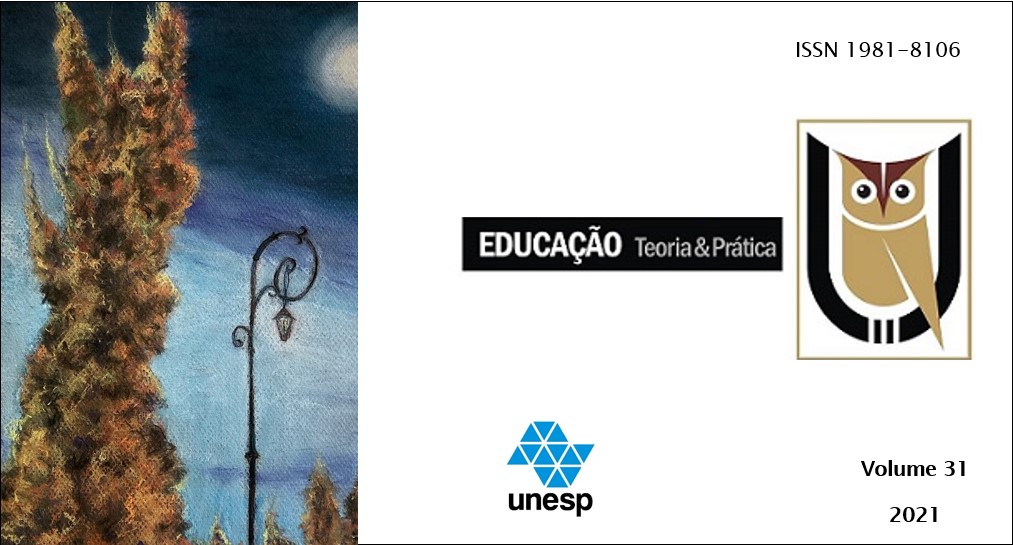From student to teacher: perceptions about literature classes
DOI:
https://doi.org/10.18675/1981-8106.v31.n.64.s15319Keywords:
Teacher Training. Literature Class Models. Didactics of Literature.Abstract
This article aims to present, analyze, and relate the models that guided the basic education literature classes which a literature and language undergraduate experienced as student; and the models that he adopts to teach literature in his professional practices as language teacher on basic education. For that purpose, it was conducted an interview, in which the participant could describe the literature classes, both that he attended as student and teach as a teacher and analyze them from the perspective of what was called class model definers and demonstrators: class dynamics, content, didactic material and evaluation. Based on his answers, it was concluded that the literature classes which he attended as basic education student was guided by the historiographic model. It was also concluded that, although the participant had expressed dissatisfaction about that model, as a teacher, he tends to reproduce practices that characterize it.
References
ABREU, M. Cultura letrada – Literatura e leitura. São Paulo: UNESP, 2006.
CANDIDO, A. O direito à Literatura. In: CANDIDO, A. Vários escritos. São Paulo: Duas Cidades, 1995.
COLOMER, T. Introdução à literatura infantil e juvenil atual. São Paulo: Global, 2017.
COSSON, R. Letramento literário: teoria e prática. 2. ed. São Paulo: Contexto, 2018.
DALVI, M. A.; SCHWARTZ, C. M.; TRAGINO, A. A literatura no vestibular: traços de seu histórico e olhares recentes. Via Atlântica, São Paulo, n. 28, p. 215-230, 2015.
FISCHER, L. A; LUFT, G.; FRIZON, M.; LEITE, G.; LUCENA, K.; VIANNA, C.; WELLER, D. A Literatura no Exame Nacional do Ensino Médio (ENEM). Nonada: Letras em Revista, Porto Alegre, v. 1, n.18, p. 111-126, 2012.
GODOY, A. J. Modelos de aula de literatura e seus impactos na formação de licenciandos em letras. 2019. 99 f. Monografia (Licenciatura em Letras) – Universidade Federal de São Carlos, 2019.
GONÇALVES PINTO, M. G. C. S. M. A formação do(a) professor(a) de educação superior: identidades e práticas. In: ANAIS DO ENCONTRO NACIONAL DE DIDÁTICA E PRÁTICA DE ENSINO – ENDIPE, 12, 2004, Curitiba. Anais [...]. Curitiba: ENDIPE, 2004, CD-ROM.
LAJOLO, M. O que é literatura. 3. ed. São Paulo: Brasiliense, 1983.
LEAHY-DIOS, C. Educação literária como metáfora social: desvios e rumos. 2. ed. São Paulo: Martim Fontes, 2004. (Coleção Texto e Linguagem).
LUFT, G. F. C. A abordagem da Literatura no Exame Nacional do Ensino Médio (ENEM): uma análise das provas de 2017 e 2018. Muitas vozes, Ponta Grossa, n. 2, p. 132-145, 2019.
MIZUKAMI, M. G. N. Ensino: as abordagens do processo. São Paulo: Editora Pedagógica e Universitária, 1986. (Temas básicos de educação e ensino).
PAULINO, G.; COSSON, R. Letramento literário: para viver a literatura dentro e fora da escola. In: ZILBERMAN, R.; RÖSING T. M. K (org.). Escola e leitura: velha crise, novas alternativas. São Paulo: Global, 2009. (Coleção Leitura e Formação). p. 61-79.
SIROTA, R. A escola primária no cotidiano. Porto Alegre: Artes Médicas, 1994.
SUASSUNA, L.; SILVA, T. L. A literatura em provas e exames: vestibular da UFPE e Enem. Estud. Aval. Educ., São Paulo, v. 30, n. 74, p. 362-391, 2019.
TARDIF, M. Saberes Docentes e Formação Profissional. Petrópolis: Vozes, 2002.
VENÇÃO, P. V. C. A literatura no enem (2013-2017): reflexões sobre ensino e formação de leitores. 2019. 171 f. Dissertação (Mestrado em Letras) – Universidade Federal do Piauí. 2019.
ZILBERMAN, R. A escola e a leitura de literatura. In: ZILBERMAN, R.; RÖSING T. M. K (org.). Escola e leitura: velha crise, novas alternativas. São Paulo: Global, 2009. (Coleção Leitura e Formação). p. 17-39.
Downloads
Published
How to Cite
Issue
Section
License
Authors who publish in this journal agree to the following terms:
a) Authors assign copyright to the journal, with the work simultaneously licensed under the Creative Commons Attribution License that allows sharing of the work with acknowledgment of authorship and publication in this journal.
b) The policy adopted by the Editorial Committee is to assign copyright only after a period of 30 months from the date of publication of the article. After this time, authors interested in publishing the same text in another work must send a letter to the Editorial Committee requesting the release of the assignment of copyright and wait for a response.
c) This journal provides public access to all its content, since this allows greater visibility and reach of published articles and reviews. For more information on this approach, visit the Public Knowledge Project, a project that developed this system to improve the academic and public quality of research, by distributing OJS as well as other software to support the public access publication system to academic sources. The names and email addresses on this website will be used exclusively for the purposes of the journal and will not be available for other purposes. This journal provides open any other party  This work is licensed under a Creative Commons License
This work is licensed under a Creative Commons License











